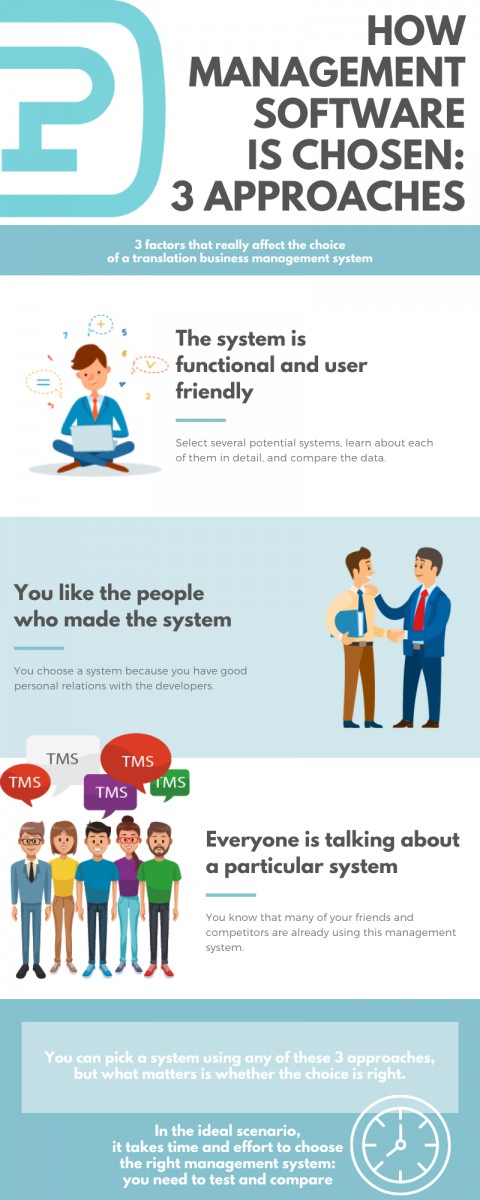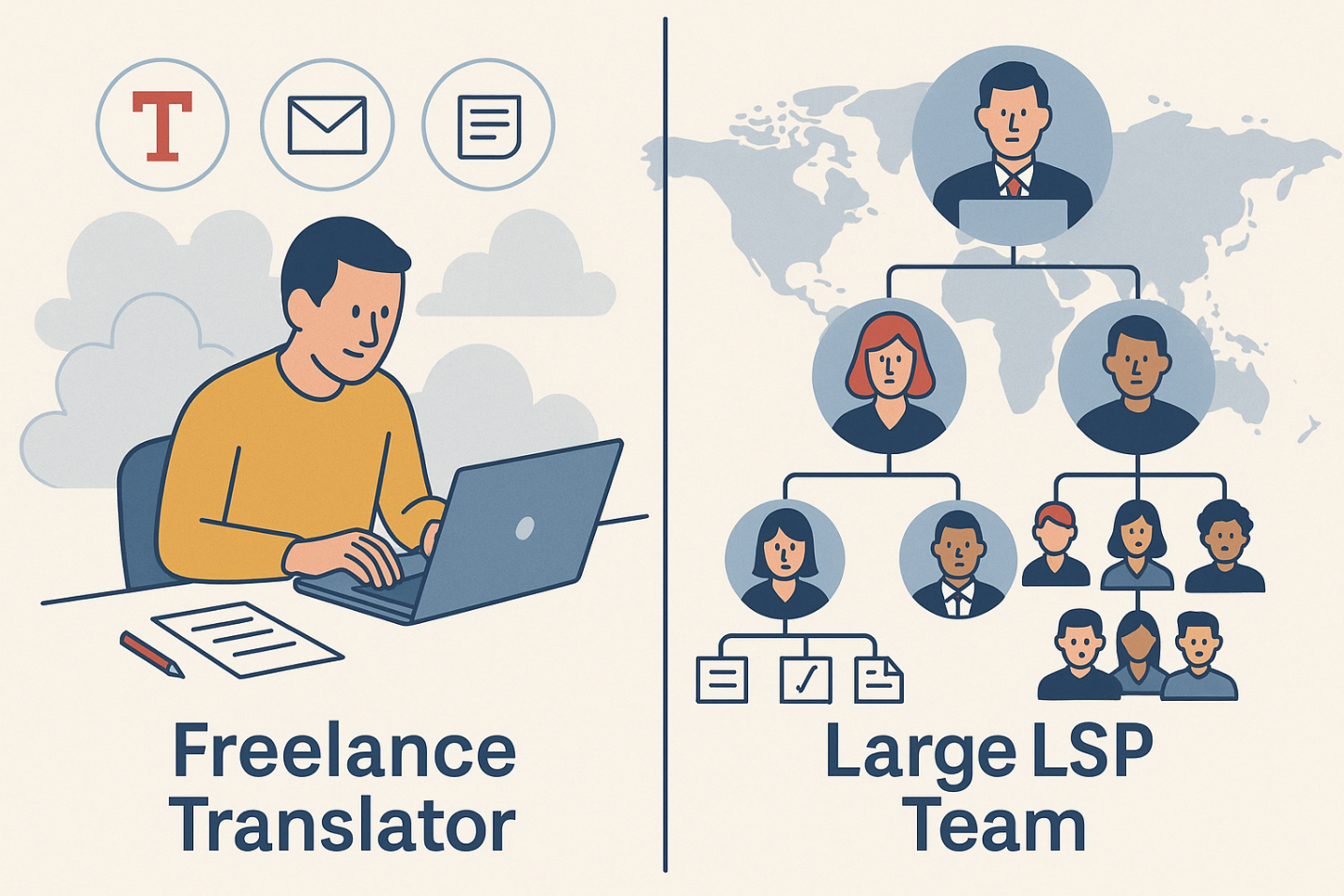
In a translation agency that is growing, it becomes increasingly difficult for its managers to keep track of everything that is going on. Inevitably such an agency will need to introduce a specialized translation business management system in order to carry on growing successfully: such a system simplifies project management, accounting and communication with translators. In addition, it means you can see the big picture with a just few clicks of the mouse: ongoing projects, bottlenecks, income distribution by month, manager, effectiveness, etc.
No matter how difficult the search for a suitable system is, sooner or later you will have to take the plunge. Below we will consider three factors that really affect the choice of a translation business management system.
The system is functional and user friendly
The most rational approach: select several potential systems, learn about each of them in detail and compare the data.
This approach seems logical: it allows you to draw conclusions based on objective information. It is extremely important to make the right choice: subsequently, it will be difficult to switch to another system. Switching to a management system is a long and expensive process, and is even more complicated than introducing a system from scratch.
Many people make the wrong choice. Whilst constantly complaining about the developer of their management system, many translation agencies continue to use the system as they are far from eager to begin the painful process of transitioning to another system.
But choosing a system in such a rational way is a long-winded process, and agency heads typically do not have time for this. So they often choose an easier route.
The system was developed by good people
With this approach, trust and personal relations play a key role: you choose a system not because it suits you, but because you know and like its developers. The localization market is rather small, everyone attends the same conferences, and it is easy to make a personal acquaintance with a developer. They themselves willingly make acquaintances, hoping in the future to turn them into buyers.
Usually events unfold as follows: you met the developer at an event and talked with them about business, football, fashion, family, etc. Later, you ended up at the same table in a pub or together on a sightseeing bus, and provided each other with some small-scale services. And then it miraculously turned out that the translation management system that they are developing is perfect for your company, and you buy it.
So, you choose a system not because of its qualities, but because its developer made a good impression on you. Having gained their confidence, you will learn more about them as a person and project your attitude towards that person on the software product they have developed.
We have witnessed this first hand: We demonstrated our business management system to the head of a translation agency, but it did not make much impression on him. Two years later, we showed it to him again, and he concluded: “It is much improved!” The system had really become more powerful and functional; two years is a significant period in the life cycle of a software product. But both times we demonstrated only the basic functions that had not undergone significant changes. Why, when the demonstration was repeated, was the system suddenly “much improved”? — because in two years he knew much more about us and was more positive from the outset.
This story once again confirms the axiom: people buy from people. People are naturally drawn to others who can safely store their corporate data and ensure the smooth operation of their company. If you have looked into a person’s eyes and shaken their hand, then not only a business but a personal and trust-based relationship has been established between you. And you can figure out the nuances of the system later.
Everyone is talking about the system
In this case, the brand plays a decisive role. You constantly see the logo of the developer company, it appears in the news and you see its stand at industry exhibitions. In addition, you know that many of your friends and competitors are already using this management system.
When the time comes to implement a system in your translation agency, your are already part way to making your choice, especially if you have not been actively searching for alternatives. You have developed a positive attitude towards the brand, although you do not have friendly relations with the people who created it and have not conducted any comparative testing of the available software products. The brand, as they say, “is very familiar.”
One head of a translation agency substantiated his choice as follows: “When I bought this system, I knew that it was like a buying BMW, but for the translation industry.” He did not even test the system: he was sure that such a “cool” system would have no major drawbacks.
There is nothing wrong with buying into a brand instead of the product itself, if you keep in mind two things.
First, when buying into a brand, you pay not only for the product itself, but also for its marketing. In the case of business management systems, you pay not only for the work of programmers, but also for advertising banners on the Internet, sponsorship at conferences, exhibition stands, souvenirs, etc. The developer has invested a lot of money in promoting the brand of his product. Of course, all this will be included in the price of the product, and then these marketing costs will be returned to the company in the form of increased payments from end users.
Secondly, quite often the owner of a recognizable brand does not pay due care and attention to their customers, especially small ones. They have hundreds of clients, many of which are many times larger than you, and here you are with your small problem. It’s easier for them to ignore your inquiry than to spend time dealing with it. They are not afraid to lose you as a client: even if take your business elsewhere, they can easily stomach losing you as a client. After all, you have already bought the system, which means that you are not going anywhere and will have no choice but to continue using it.
Conclusion
The final decision of a translation agency head is rarely taken based on just one of the factors described above: it is usually based on a combination of these factors.
In the ideal scenario, it takes time and effort to choose the right management system: you need to test and compare. But we are all human, and emotions often get in the way of the selection process, especially if it seems that following your emotions will save time. But it’s important to at least be aware of what precisely is motivating you when you make that choice. After all, your choice of a translation project management system will largely determine the success of your company for years ahead.



.png)
.png)

